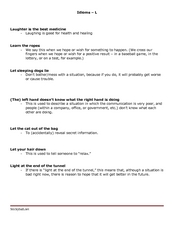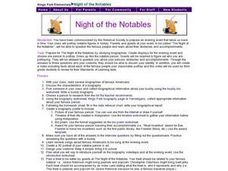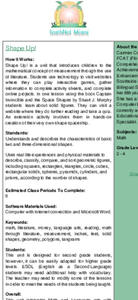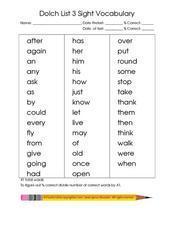Roald Dahl
Matilda - Miss Honey and The Trunchbull
As the instructor reads aloud several quotes from five chapters of the story Matilda, class members mime their interpretation of the scenes. Then, after reading "Miss Honey" and "The Trenchbull" (chapters seven and eight), the class...
Lakeshore Learning
Grade 3 Test-Taking Strategies and Tips
Promote the most positive reading test-taking strategies to your third graders. A six-question practice test suggests using context clues, underlining words, rereading, and using process of elimination to choose the best answer when it...
Curated OER
Eating Up Idioms
Ah, food idioms! Now that sounds tasty. Class members read and discuss various food-related idioms, create an illustration of a food-related idiom, and develop a class book or bulletin board to celebrate figurative language and National...
Curated OER
Common Idioms 5
If you have been analyzing idioms, you can assess your learners' grasp of their figurative meanings with this 10-question matching exercise. Or you could give the sheet to groups to foster discussion about literal versus figurative...
Curated OER
Let's Go Exploring!
Use a Courbet painting of a cave or tunnel opening to reinforce the importance of descriptive writing. Writers of all ages use sensory details to describe what the scene depicts as they pretend to be in the painting. Then they imagine...
Curated OER
Onomatopoeia
Some words actually sound like their meaning. When this happens, it's known as onomatopoeia. Learners look at a series of pictures, and match up a bunch of words with the pictures they sound like. For example, the word buzz would go with...
Curated OER
Borrowing Narrative Skills from Mr. Fletcher: Using a "Prompts in Reverse" Technique to Inspire Your Writers
Help your class find their writing voices with this lesson which uses the work of Ralph Fletcher to guide a "Prompt in Reverse" activity. Using the chapter "First Pen" from Fletcher's Marshfield Dreams, learners decipher what they...
Curated OER
Geo Jammin' By Design - Day 7, Lesson 38: Kool Cups
Create geometric cups by interpreting directions, informational text, and mathematical concepts. Critical thinkers apply geometric theory (congruent shapes, patterns, symmetry) to actual directions to create a cup that holds Kool Aid....
Book Units Teacher
Skill Lessons – Prefixes and Suffixes
Sometimes the best way to understand a concept is to break it down. Young vocabulary pupils work with word parts in a hands-on activity that prompts them to connect flash cards with affixes to their root and base words. Additionally,...
Curated OER
Homophones Activities 1-5
For this language arts worksheet, students discover that homophones are words that sound alike. Students complete 5 activities with homophones: matching words to pictures, completing sentences, explaining differences between words and...
Curated OER
Homophones (Higher)
In this language arts worksheet, students read and analyze 10 sentences which have a missing homophone. From the 2 choices provided, students fill in the correct word.
Curated OER
Poetry and PowerPoint
Third graders read and discuss the poem, "April Rain Song" by Langston Hughes. After brainstorming examples of vivid verbs, figures of speech, language patterns, and imagery used in the poem, 3rd graders write a poem on a topic of...
Curated OER
Idioms that start with L
In this idioms activity, students read a list of idioms that start with the letter L and their definitions, and then answer questions by giving advice with the idioms. Students complete 6 questions.
Curated OER
Idioms Quiz: Body 5
In this idioms quiz worksheet, students complete multiple choice questions where they choose what the idioms about the body mean. Students complete 10 problems total.
Curated OER
Practice Idioms in English!
In this idioms worksheet, learners fill in the blanks with the correct verbs, nouns, colors, and more to make idioms. Students complete 30 problems total.
Curated OER
Walk on the Wild Side
Have your class practice alliteration using this lesson. Learners listen to stories with alliterative elements and create their own sentences illustrating this technique. The lesson is incomplete, but could be enhanced to provide a...
Curated OER
Night of the Notables
Students read several biographies of famous Americans and discuss the characteristics of a biography. Students collect biographical information on another person in the class and write a biography. Students research and create a...
Curated OER
TAKS Quiz-Word Meaning
In this TAKS quiz activity, students take an online quiz focused on word meaning similar to an underlined word. Quiz may be graded online by clicking a link.
Curated OER
Names Word Search
In this literacy worksheet, students find the words that are about names and the answers are found by clicking the link at the bottom of the page.
Curated OER
Shape Up!
Students investigate measurement through the use of literature through this series of lessons.
Curated OER
Dolch List 3 Sight Vocabulary
In this literacy worksheet, 3rd graders read sight words in rows that give the challenge of 41 words. They are given a raw score to determine the reading level.
Curated OER
Adopt An Animal
Students view slides of pictures of rare animals and make predictions about them based on the characteristics they see. In this animals lesson plan, students then research one of the animals and present their findings to the class.























